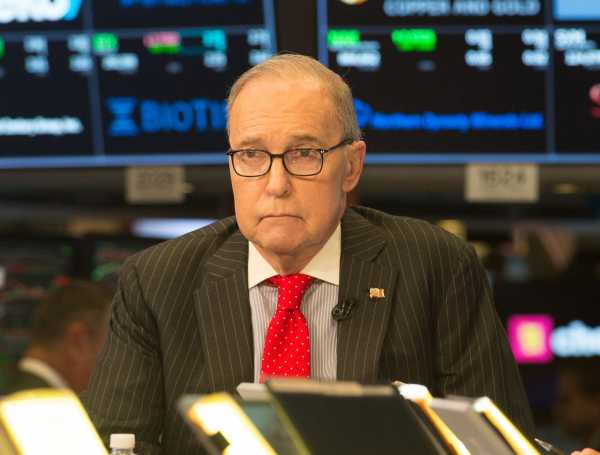
President Donald Trump’s love for, and obsessive viewing of, cable news is well-documented, so perhaps it should come as no surprise that his new pick as chief economic adviser is a veteran talking head: Larry Kudlow, a longtime CNBC fixture, economic commentator, and weekend radio host, will replace Gary Cohn as director of the National Economic Council (NEC).
Like Cohn, Kudlow worked for decades in the financial sector, rising to become chief economist at Bear Stearns before pivoting to punditry in the 1990s. But unlike Cohn, Kudlow is an extremely doctrinaire supply-sider, almost to the point of parody. It is only a very slight exaggeration to say that Kudlow thinks every major social problem can be solved by cutting tax rates on corporations and the rich. He’s also an ardent free trader, a point of sharp contrast with the president, whose protectionist tendencies helped spur Cohn to leave.
At the same time, Kudlow’s long history of (often failed) prognostications has perhaps given him an ability to shift with the winds, which could be an invaluable asset in a White House helmed by a mercurial president.
Here’s what to know about Kudlow, and what to expect him to accomplish during his time in the White House.
Larry Kudlow: a brief biography
Kudlow, 70, is not a credentialed PhD economist, a fact that is hardly unusual in this job. (Cohn’s only degree was a bachelor’s in business administration.) But it did cause some controversy a few months ago when Trump considered him for chair of the Council of Economic Advisers (CEA).
That’s a job that really is normally reserved for economists with PhDs. The CEA chair prepares economic projections and forecasts the likely macroeconomic effects of the president’s budget and other policy proposals, whereas the director of the NEC plays more of a coordinating role, bringing together different branches of government in formulating the president’s plans and serving as the president’s main go-to staffer on economic policy. It’s a more political, and less academic, position than CEA chair.
A 1994 profile of Kudlow in the New York Times reports that after growing up in New Jersey in an affluent family that “owned a textile business, worked hard for Republican causes and frequently replaced the Jaguar in the driveway with a new model,” he became in the ’60s a vehement antiwar activist as a history major at the University of Rochester, where he joined Students for a Democratic Society.
He then briefly attended the Woodrow Wilson School at Princeton, studying “politics and some economics” as part of the school’s public policy curriculum, but left without a degree and became a staff economist at the Federal Reserve Bank of New York. Then, “[a]t the age of 28, with no degree in economics, he became the chief economist of one of the nation’s biggest brokerages, Paine Webber, doubling his salary in the process,” the Times’s Sylvia Nasar and Alison Leigh Cowan wrote. By this point, he had shifted significantly to the right and begun to develop a reputation as a free marketer.
In 1979, at 32, he became chief economist at Bear Stearns, the investment bank, a gig he then parlayed into a role as chief economist at the Office of Management and Budget (OMB) under Ronald Reagan. There, he was the No. 2 man to OMB Director David Stockman, a former Congress member and early key adviser to Reagan.
“I had met him during my whirlwind tour of Wall Street” during the presidential transition, Stockman wrote in his memoir, “and had been highly impressed.” He recalls Kudlow as a “supply sider who worked with a three-legged stool,” that is, advocating “sound money” (read: low inflation), “sound taxation” (read: tax cuts), and “sound budgets” (read: spending cuts).
Stockman recalls Kudlow as an ally who agreed with Stockman that Reagan’s tax cuts were producing large deficits, and who tried to release less rosy numbers about future deficits, over heavy opposition from the rest of Reagan’s team. This dispute would wind up contributing to Stockman’s marginalization within the administration, particularly after Stockman made damning comments about Reagan’s economic policy in an interview with the Atlantic’s William Greider in late 1981. Kudlow fell out of favor along with Stockman and left the administration in 1983.
(Stockman today has argued that Kudlow would be “exactly the wrong voice” to have in the NEC job, as he doubts Kudlow will challenge Trump on his record deficits the way the two of them challenged Reagan, given how dogmatic Kudlow has become about large tax cuts since his last stint in government.)
After his time working for Stockman, Kudlow ran a DC-based consulting firm for a few years before returning to Bear Stearns. Nasar and Cowan describe him as an excellent salesperson, using his forecasts to pitch the firm to clients, with a “relatively strong” forecasting record.
During this same period, in the late 1980s and early ’90s, he began to struggle with substance use, particularly alcohol and cocaine. After missing a scheduled speech before 200 investors in early 1994 amidst these struggles, he and Bear parted ways and he moved on to National Review as economics editor. He is very open about his struggles with addiction, has been sober for years now, and converted to Catholicism during the process of recovery.
That marked a pivot toward a career as an economics commentator. He began co-hosting a CNBC show with Jim Cramer in 2002, which led to a succession of shows: first Kudlow & Cramer, then Kudlow & Company, and finally The Kudlow Report, which ceased airing in 2014, though Kudlow still appears on the network frequently.
Throughout it all, Kudlow remained active as an adviser to Republican politicians. He advised New Jersey gubernatorial candidate Christine Todd Whitman to propose a Reagan-esque suite of tax cuts back in 1993, when he was still at Bear.
Most recently, in 2016, he and fellow supply-sider Stephen Moore of the Heritage Foundation worked to tweak Donald Trump’s campaign tax plan to reduce its price tag (an odd task to assign to two noted fans of massive cuts).
Kudlow even weighed some runs for higher office himself. He considered running against Richard Blumenthal for a Connecticut US Senate seat in both 2010 and 2016, and against Chuck Schumer for a New York seat those same years.
Kudlow is a die-hard supply-sider
As you might expect from someone whose economics experience comes mostly from working on Wall Street and for media outlets close to finance, Kudlow is a dyed-in-the-wool supply-side fan. He favors aggressive cuts to marginal tax rates, particularly on top earners, capital income, and corporations.
He has enthusiastically backed the Trump administration in its contention that its tax cuts (which, as Kudlow would advise, cut the top individual rate and dramatically slash the rate on corporations) will boost economic growth to 3 to 4 percent. “With the supply-side model of lower marginal tax-rate incentives to work, save, and invest, plus significantly less tax avoidance and sheltering, the economy will move back to its normal, steady-state pattern of 3 to 4 percent growth,” Kudlow wrote in a CNBC column.
During the tax reform debate, he was skeptical of measures that he viewed as distractions from the core goal of rate cuts. He was, for instance, an opponent of the “border-adjusted tax” on imports that congressional Republicans floated as a way to pay for cuts, calling the proposal “an exercise in government planning and complexity that I believe is doomed to fail.”
Instead, he argued for a “three easy pieces” plan with a 15 percent corporate tax rate, “full expensing” of business investments (that is, letting businesses deduct all their expenses without depreciation), and a one-time repatriation tax of 10 percent on overseas profits. (The final bill cut the corporate rate to 21 percent, offers full expensing for five years, and taxes foreign profits at 8 percent or 15.5 percent, depending on whether they’re in physical things like factories or in stuff like stocks and bonds that’s easy to sell.)
Kudlow was also dismissive of efforts to increase the child tax credit, especially at the expense of corporate tax cuts, calling Sen. Marco Rubio’s (R-FL) call to mildly shrink the corporate cuts to pay for a more expansive child credit for families “completely backwards.”
“Key pro-growth policy is abolish/reform corp tax,” he tweeted in 2014. “Then flat tax for individuals.Child tax credit not my favorite. #tcot.”
This faith in the power of supply-side tax cuts has gotten him into trouble as a prognosticator on more than a few occasions. As longtime Kudlow critic Jonathan Chait notes, Kudlow was predicting in 1993 that Bill Clinton’s hikes to top rates would preclude an economic recovery. By 2000, when it was clear that hadn’t happened, he was crediting the economic boom to Reagan’s cuts nearly two decades earlier:
He was such a firm believer in George W. Bush’s tax cuts that he was proclaiming as late as December 2007 that “The Bush boom is alive and well.” (That month marked the beginning of the Great Recession.) In July 2008, he proclaimed that the housing market was recovering. Then in 2011, as the economy began recovering under President Obama, Kudlow credited the positive developments to Bush’s tax cuts.
That wasn’t the only policy of Bush’s he preferred. In June 2002, he argued for an invasion of Iraq on the grounds that “the shock therapy of decisive war will elevate the stock market by a couple-thousand points.” The US did invade; the stock market did not rise by thousands of points thereafter.
Will Kudlow mesh with Trump?
One of the biggest questions for Kudlow is how he will handle disagreements with Trump, who has not always toed a doctrinaire supply-side, laissez-faire line on economic issues. Kudlow is surprisingly soft on Social Security for a conservative economic type, saying he thinks predictions of insolvency are overblown but he supports private accounts, which Trump’s promise to not touch the program would seemingly rule out.
Most relevantly right now, Kudlow is a vehement critic of tariffs on trade and, along with Moore and Art Laffer, wrote a column denouncing the Trump administration’s new tariffs on steel and aluminum this month. “Trump should … examine the historical record on tariffs,” they wrote. “If he does he’ll see they have almost never worked as intended and have almost always delivered an unhappy ending.”
Kudlow was even tougher on the policy on his radio program. “Even his senior staff didn’t seem to know” the change was coming, Kudlow said of Trump, in an odd bit of foreshadowing of his life. “It seemed bungled and weird. Look, I’m a big supporter of Trump … But trade matters a lot, and tariffs, which are taxes, matter a lot.” While he said the tariffs wouldn’t lead to catastrophe, he clarified that if they lead to the disintegration of NAFTA, they would cause economic catastrophe.
Later on in the program, he urged Gary Cohn to stay in his job, in part to push against additional tariffs. Whoops.
But Moore told the New York Times’s Maggie Haberman and Jim Tankersley that Kudlow had come to terms with the change in recent days, saying the “administration’s tweaks to its tariff plan — such as providing country exclusions — had made it significantly more palatable to Mr. Kudlow.”
Kudlow has shown a similar ideological flexibility in advocating for Trump in the past. While as late as December he was arguing for the tax cuts on the grounds that they wouldn’t just lead to companies funneling cash back to shareholders in the form of share buybacks, and would instead lead to real investment, research and development, and the like, by January he was arguing for the cuts on the grounds that they would cause more buybacks, which, in the intervening month, he had decided were good:
The question, then, is whether Kudlow will do what he advised Cohn to do — serve as a free market voice who can push against Trump’s worst instincts — or whether he will bend his positions so as to better support Trump’s policies, whatever those might be.
Sourse: vox.com






